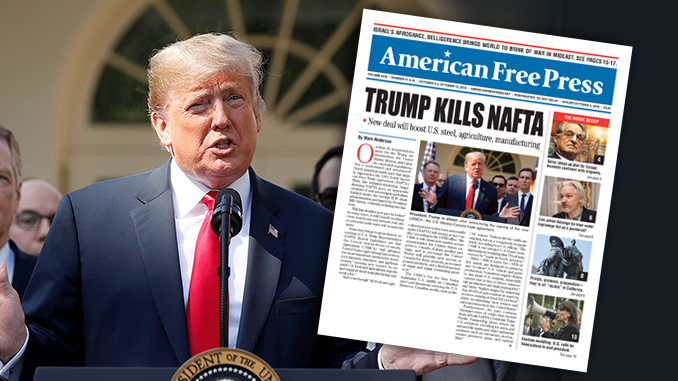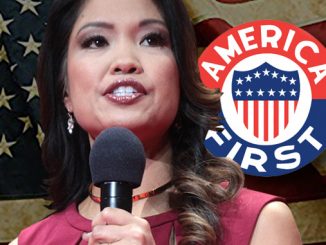
The new U.S.-Mexico-Canada trade agreement, which replaces the North American Free Trade Agreement created under Poppy Bush’s administration, will boost U.S. steel, agriculture, and manufacturing, and further President Trump’s America-first agenda, according to the U.S. Trade Representative.
By Mark Anderson
On Sept. 30, in a pivotal moment for the Trump administration, the United States, Mexico, and Canada concluded negotiations “for a modernized and rebalanced” North American trade pact that largely supersedes the 1994 North American Free Trade Agreement (NAFTA). Thus, the industry-depleting, wage-slashing NAFTA pact, an unpopular creature of anti-sovereignty globalism birthed under the George H.W. Bush administration and signed by President Bill Clinton, evidently is fading into history.
Will this detailed new pact be better? In many ways, it will benefit working-class Americans and farmers, but other previous trade rules will remain the same.
Some key things to glean from it, according to U.S. Trade Representative (USTR) Robert Lighthizer, are that the United States-Mexico-Canada Agreement (USMCA) “will advance United States agricultural interests in the most important markets for America’s farmers, ranchers, and agribusinesses,” opening new venues “to expand U.S. food and agricultural exports and support food manufacturing and rural jobs.”
And even though “all food and agricultural products that have zero tariffs under [NAFTA] will remain at zero tariffs,” according to the USTR office, “the USMCA will create new market-access opportunities for United States exports to Canada of dairy, poultry and eggs, and in exchange the United States will provide new access to Canada for dairy, peanuts, processed peanut products, and a limited amount of sugar and sugar containing products.”
The USMCA for the time being maintains U.S. tariffs on Canadian steel and aluminum entering the U.S.
However, Canadian media, such as the CBC, report: “Talks to lift the tariffs are ongoing, but on a ‘completely separate track,’ according to a U.S. official.” The USMCA encourages U.S.-based manufacturing by requiring that 75% of auto content be “made in North America.”
Other USMCA rules, the USTR office noted, are designed to preserve and “re-shore” U.S. vehicle and parts production; “transform supply chains to use more U.S. content, especially content that is key to future automobile production and high-paying jobs”; and drive “higher wages by requiring that 40-45% of auto content be made by workers earning at least $16 per hour” while incentivizing “new vehicle and parts investments in the United States.”
Furthermore, the pact contains “stronger rules of origin that exceed those of both NAFTA 1.0 and the Trans-Pacific Partnership [from which the U.S. withdrew] including for autos and automobile parts and other industrial products such as chemicals, steel-intensive products, glass, and optical fiber.”
Mark Anderson is AFP’s roving editor.





Not realy. Just in speech but not action like a lot of other issues. Immigration larger and open. No closed door but to Muslims.